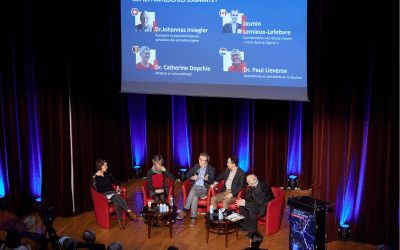Subsequent to a press release by the National Federation of Medical Gynecology Colleges (FNCGM) *, a hundred professionals immediately retaliated in defense of natural contraceptive methods based on observation of female fertility periods.
In their press release, the FNCGM discredited “natural birth control methods” as being unreliable; quoting “an approximate failure rate of 17-20%“. These gynecologists allege that there is a connection between the high abortion rate in 20-24 year olds and the use of natural birth control methods.
To refute this misinformation, over a hundred of caregivers, doctors, pharmacists, gynecologists and midwives have asked “to cease misinformation on natural methods”. In the aftermath of the press release and numerous articles that followed, it seemed “important to rectify and clarify the situation for women to receive genuine and truthful information” regarding “the various amalgams”. In addition, on March 1st, an on-line petition was created. Due to the amalgams with other contraceptive practices, they reiterate that “very reliable natural methods are available, have been scientifically evaluated and have been proven to be efficacious on a worldwide basis”. They have been developed by medical researchers and the techniques are taught by accredited instructors. They explain that “to guarantee a high rate of effectiveness, the methods require rigor and training, (no autodidact or self-taught improvising)”. They testify that “numerous women and couples are perfectly satisfied with these methods and with the ease of incorporating them into their life-style”.
The elevated number of abortions in France pertains to what the authorities refer to as the French contraceptive paradox. According to the Inspectorate General of Social Affairs “IGAS”, 72% of French women who aborted said they were using contraceptives when their pregnancy was announced. The ramification whereby complete trust in technology is proven infallible makes an unplanned pregnancy more arduous to accept. Abortion is frequently a systematic recourse, often due to outside pressure from the partner; or pressure from family members for teenage pregnancies. Nonetheless, “It is illusory to believe that fertility can be perfectly controlled. [1]”: pregnancies occur even when using IUD’s, and when taking birth control pills, (which can sometimes be forgotten).
For those aged 20-24, (the group with the highest overall number of abortions), the actual proportion decreased slightly between 2010 and 2016. As the French National Institute for Demographic Studies “INED” states: “Despite more tolerant and diversified family life styles, (Déchaux, 2009), restrictive criteria for reproduction prevail. Besides the requisite of being a couple (and having a stable relationship with a mutual consensus to become parents), there are now supplementary norms concerning age, financial resources for child-rearing, and the “ideal” spacing between 2 births. These criteria regulate contraceptive and reproductive practices throughout a woman’s reproductive life cycle, including the period of “sexual adolescence”. Despite a high use of contraception and the progress made in fertility control, the assertion of abortion as a right, as well as the extension of the “adolescent” period, have led to an increase in abortion rates for the 18-25 year-old group.”
Following the crisis with the 3rd and 4th generation birth control pills, women have become more reluctant about using medical contraception. Currently, a new trend is developing where some women are reconsidering their contraceptive choices and are requesting a more “organic” or natural approach for their bodies’ overall health. Gynecologists, and society as a whole, need to discuss the challenge launched by these women’s aspirations for being treated more “naturally”, whith more respect for their body. There is room for discussion, provided it is an open, non-biased discussion.
[1] IGAS 2010, French report on abortions performed
International Symposium on the End of Life – Euthanasia and Assisted Suicide Worldwide
At a time when France is considering legalising euthanasia and assisted suicide, Alliance VITA, together with IEB...



